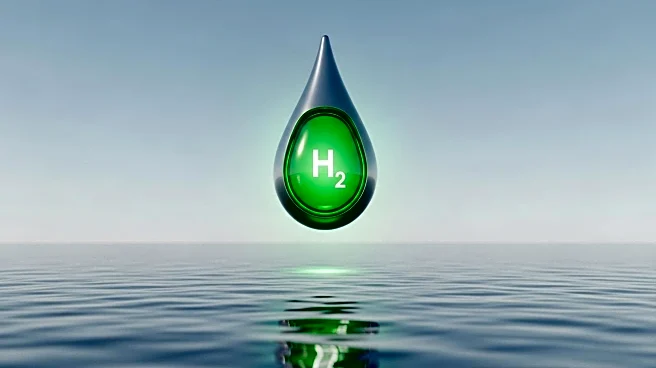What is the story about?
What's Happening?
Oman is advancing a green hydrogen maritime corridor from Duqm to Amsterdam, supporting the International Maritime Organisation's Net Zero greenhouse gas targets by 2050. The initiative involves producing green hydrogen using solar and wind energy in Duqm, with plans to transport it to Europe. The corridor concept was solidified through agreements with the Netherlands and Belgium, aiming to establish offload points in Antwerp and Duisburg. The project faces regulatory and technical challenges, including the need for harmonized safety regulations and technical standards for hydrogen bunkering and ship operations. BP has increased its stake in the Hyport Duqm project, highlighting confidence in Oman's green hydrogen strategy.
Why It's Important?
The development of a green hydrogen corridor is significant for the maritime industry, as it represents a shift towards sustainable energy solutions. This initiative could position Oman as a leader in green hydrogen production and export, potentially influencing global maritime practices. The project supports international efforts to reduce greenhouse gas emissions, aligning with broader environmental goals. Stakeholders in the energy and maritime sectors stand to benefit from new business opportunities and technological advancements. However, the success of the corridor depends on overcoming regulatory and technical hurdles, which could impact the pace of adoption and implementation.
What's Next?
Commercial operations for the green hydrogen corridor are scheduled to begin in 2030. The project requires the development of a project management framework to support port infrastructure development. The Maritime Technologies Forum is considering the necessary international standards for hydrogen bunkering. As the project progresses, stakeholders will need to address financial and engineering challenges to ensure efficient implementation. The involvement of major companies like BP suggests ongoing investment and interest in the project, which could drive further advancements in green hydrogen technology and infrastructure.
Beyond the Headlines
The initiative could have long-term implications for global energy markets, potentially reducing reliance on fossil fuels and promoting cleaner energy sources. It may also influence regulatory frameworks and industry standards, setting precedents for future green hydrogen projects. The collaboration between Oman and European countries highlights the importance of international partnerships in addressing climate change and achieving sustainability goals. The project could also stimulate economic growth in Oman, creating jobs and attracting investment in renewable energy sectors.

















